

Jefferson, MA 01522. The Reading & Writing Project - Units of Study. Writer's Toolbox-A Writer's Workshop Website. How to start a Writer's Workshop (Elementary, Reading/Writing) New Page 1. Management Ideas for Writer's Workshop Updated 6/06 Here are a few questions that I had when I began teaching Writer's Workshop and how I solved them.
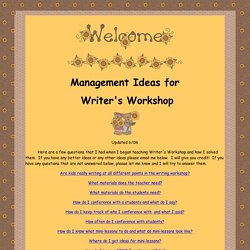
If you have any better ideas or any other ideas please email me below. I will give you credit! Beacon Lesson Plan Library. Description This is the first lesson in the unit Info Expo.
5th Grade Writing- Unit 6 Informational Writing su Pinterest. Empowering Writers Expository Writing Resources for Teachers. What exactly is expository writing?
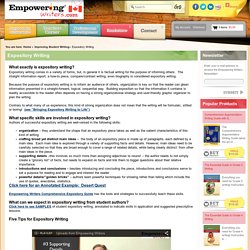
Expository writing comes in a variety of forms, but, in general it is factual writing for the purpose of informing others. The straight information report, a how-to piece, compare/contrast writing, even biography is considered expository writing. Because the purpose of expository writing is to inform an audience of others, organization is key so that the reader can glean information presented in a straight-forward, logical, sequential way. Building exposition so that the information it contains is readily accessible to the reader often depends on having a strong organizational strategy and user-friendly graphic organizer to plan the writing.
Contrary to what many of us experience, this kind of strong organization does not mean that the writing will be formulaic, stilted or boring! Literacymalden - Writing. New Page 1. DDN Curriculum Unit Components and Clarification: Unit of Study Title – Writers in Evolution Topic Area – Language Arts / Writing Grade Level – Third through Fifth Time Frame – Six one week sections Key Words: ideas and organization, organization, voice, word choice, sentence fluency, conventions, presentation, traits.
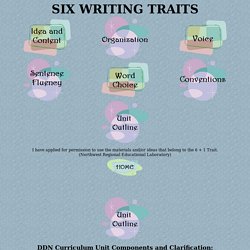
Writing - 6 Traits on Pinterest. Writing Mini-Lessons. TC Reading and Writing Project. The Teachers College Reading and Writing Project is a research think tank and staff development organization housed at Teachers College, Columbia University.
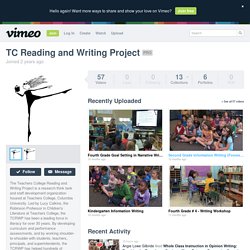
Led by Lucy Calkins, the Robinson Professor in Children's Literature at Teachers College, the TCRWP has been a leading force in literacy for over 30 years. By developing curriculum and performance assessments, and by working shoulder-to-shoulder with students, teachers, principals, and superintendents, the TCRWP has helped hundreds of thousands of schools to provide more rigorous and joyful reading and writing instruction. The Project works closely with schools in 23 countries, in all parts of the US, and especially in New York City. Hundreds of thousands of teachers have attended one of the seven institutes the TCRWP leads each year at Teachers College, Columbia University. The Teachers College Reading and Writing Project is deeply involved in helping schools implement the Common Core. Untitled. Session 6: Conversations Among Writing Peers: Video 12: Peer Conferences.
Watch the 30-minute video "Peer Conferences.
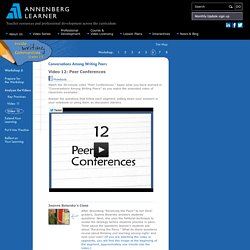
" Apply what you have learned in "Conversations Among Writing Peers" as you watch the extended video of classroom examples. Answer the questions that follow each segment, jotting down your answers in your notebook or using them as discussion starters. Session 6: Conversations Among Writing Peers: Video 11: Conversations Among Peer Writers. Watch the 30-minute video "Conversations Among Writing Peers.
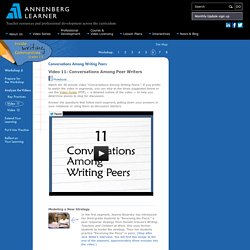
" If you prefer to watch the video in segments, you can stop at the times suggested below or use the Video Guide (PDF) — a detailed outline of the video — to help you determine places to stop for discussion. Answer the questions that follow each segment, jotting down your answers in your notebook or using them as discussion starters.
Modeling a New Strategy In the first segment, Jeanne Boiarsky has introduced her third-grade students to "Receiving the Piece," a peer response strategy from Donald Graves's Writing: Teachers and Children at Work. She uses former students to model the strategy. Understanding the Difference Between Revision and Editing. ShareThis There is a clear distinction between revising ideas and editing conventions.
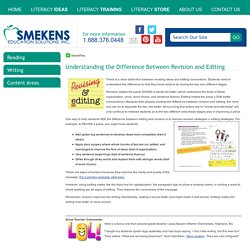
Students need to understand the difference so that they know what to do during the two very different stages. Revision makes the piece SOUND a whole lot better--which addresses the traits of ideas, organization, voice, word choice, and sentence fluency. Editing makes the piece LOOK better (conventions). Craft Minilessons. Plinky. DPI Writing Strategies. Created through a partnership with the N.C.
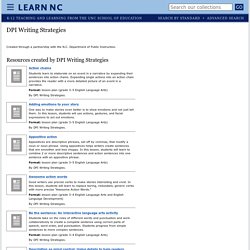
Department of Public Instruction. Action chains Students learn to elaborate on an event in a narrative by expanding their sentences into action chains. Expanding single actions into an action chain provides the reader with a more detailed picture of an event in a narrative. Format: lesson plan (grade 3–5 English Language Arts) The Reading & Writing Project - Home. Writers' Workshop K-6 - Major Components of Writers' Workshop. Every Child a Reader and Writer. NOYCE FOUNDATION: Every Child a Reader & Writer (ECRW) Resources. The Every Child a Reader and Writer initiative ended in 2009.
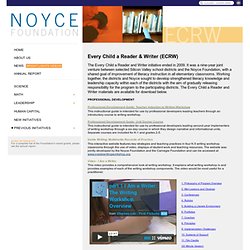
It was a nine-year joint venture between selected Silicon Valley school districts and the Noyce Foundation, with a shared goal of improvement of literacy instruction in all elementary classrooms. Working together, the districts and Noyce sought to develop strengthened literacy knowledge and leadership capacity within each of the districts with the aim of gradually releasing responsibility for the program to the participating districts. The Every Child a Reader and Writer materials are available for download below. Professional Development Guide: Teacher Induction to Writing Workshop This instructional guide is intended for use by professional developers leading teachers through an introductory course to writing workshop. Professional Development Guide: Unit Design Course. Part 1 I Am a Writer: The Writing Workshop. Overview. NOYCE FOUNDATION: Every Child a Reader & Writer (ECRW): Professional Development.
Firsthand: Units of Study for Primary Writing. Writers' Workshop K-6 - Resources. Teaching Reading K-2 Workshop: Support Materials. (3) Lucy Calkins Units of Study Writing su Pinterest. Pathways. Teaching Reading K-2 Workshop. Wachusett Regional School District. Writers' Workshop K-6 - Minilessons. Mrs. Meacham's Classroom Snapshots. Work boards help to keep students and teacher organized!
During Independent Reading, Writing, and Word Work Times: For students, they are a visual reminder of what options area available and where they should be during the independent work time. For teachers, they are an at-a-glance helper when trying to figure out who is where and when. I’ve used a pocket chart for my Independent Reading and Writing times work board in the past. Now I use the SMARTBoard. At the start of Independent Reading and Writing times, we have a “Status of the Class” meeting.
When we used the pocket chart, each student had 5 pockets in one of the rows on the pocket chart. For the SMARTboard work board, students come into the classroom and flip through the Wake Up Work SMART Board file. Writers' Workshop K-6 - Resources. Balanced Literacy » Writing Workshop. “Writers are like other people, except for at least one important difference. Other people have daily thoughts and feelings, notice this sky or that smell, but they don’t do much about it. All those thoughts, feelings, sensations, and opinions pass through them like the air they breathe.
Not writers. Writers react.” (Fletcher, 1996) Writing Workshop by Aubrey Hertzmann on Prezi. Writing Workshop by Erin McQuinn on Prezi. Iz6qf3plyrr-/7th-8th-grade-ela-workshop-teaching-writing-workshop/ Writing Mini-Lessons. Tools for Workshop Teaching / Forms, Forms, Forms. Queen of Forms Teacher forms, student forms, and record keeping forms . . . Writer's Workshop. Writer's Workshop Resources and Ideas. A meeting place for a world of reflective writers.